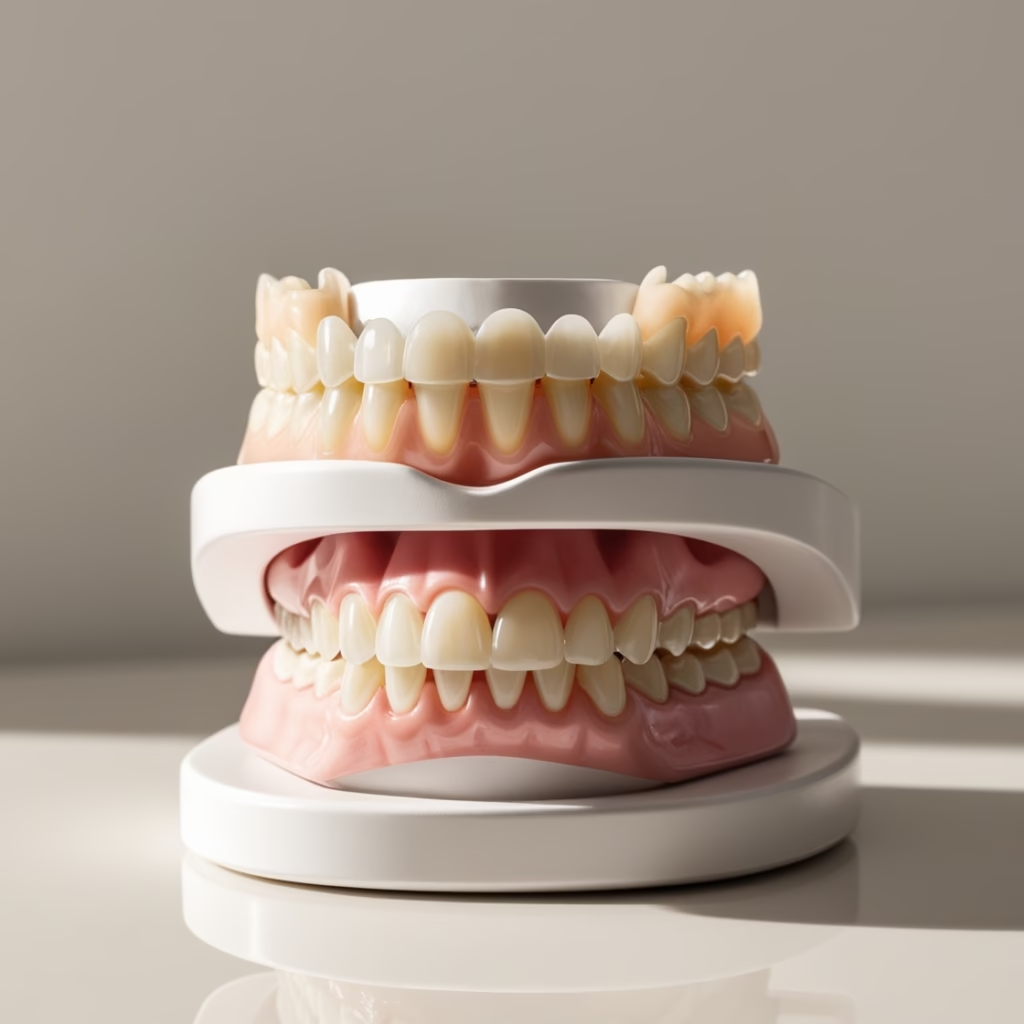When it comes to replacing missing teeth, dental bridges and dentures are two of the most common options. Each has its own benefits, limitations, and suitability depending on your dental needs, lifestyle, and budget. Understanding the differences can help you make an informed decision.
This blog will explore the key differences between dental bridges and dentures. It will discuss their advantages. You will learn how to decide which option is right for you.
Understanding Dental Bridges
A dental bridge is a fixed restoration used to replace one or more missing teeth. It consists of artificial teeth (pontics) anchored to adjacent natural teeth or dental implants.
Types of Dental Bridges
- Traditional Bridges: Supported by crowns placed on natural teeth on either side of the gap.
- Cantilever Bridges: Anchored to one natural tooth when only one adjacent tooth is present.
- Implant-Supported Bridges: Supported by dental implants instead of natural teeth, offering more stability.
- Maryland Bridges: Use a metal or porcelain framework bonded to the back of adjacent teeth.
Benefits of Dental Bridges
- Fixed and Secure: Unlike dentures, bridges are not removable, providing a natural feel and stable function.
- Aesthetically Pleasing: Blend seamlessly with natural teeth for a uniform appearance.
- Preserve Bite Alignment: Prevent remaining teeth from shifting into the empty space.
- Quick Procedure: Requires fewer appointments than implants.
Understanding Dentures
Dentures are removable prosthetics used to replace multiple missing teeth or an entire arch. They are made from acrylic, metal, or a combination of materials.
Types of Dentures
- Complete Dentures: Replace all teeth in the upper or lower jaw.
- Partial Dentures: Replace multiple missing teeth while using natural teeth as anchors.
- Implant-Supported Dentures: Attached to dental implants for added stability.
- Flexible Dentures: Made from soft, flexible materials for added comfort.
Benefits of Dentures
- Affordable: Cost-effective compared to other tooth replacement options.
- Versatile: Suitable for replacing multiple teeth or an entire arch.
- Non-Invasive: Doesn’t require surgery or alteration of adjacent teeth.
- Customizable: Can be designed to suit your preferences and facial structure.
Dental Bridges vs. Dentures: Key Differences
| Feature | Dental Bridges | Dentures |
|---|---|---|
| Durability | Long-lasting with proper care (10–15 years) | May need replacement every 5–10 years |
| Stability | Fixed and secure | Removable, can shift if poorly fitted |
| Aesthetic Appearance | Looks and feels natural | Can look artificial if poorly designed |
| Comfort | Comfortable once adjusted | May take time to adapt to wearing |
| Procedure | Requires crown placement or implants | Non-invasive fitting |
| Cost | Higher initial cost | More affordable upfront |
| Maintenance | Brushed and flossed like natural teeth | Requires removal and cleaning |
Factors to Consider When Choosing Dental Bridges vs. Dentures
- Number of Missing Teeth:
- Bridges are ideal for replacing one or a few missing teeth.
- Dentures are better for multiple missing teeth or complete tooth loss.
- Oral Health:
- Bridges require healthy adjacent teeth or implants for support.
- Dentures don’t rely on natural teeth, making them suitable for more extensive tooth loss.
- Budget:
- Bridges have a higher upfront cost but last longer.
- Dentures are more affordable initially but may need more frequent replacement.
- Lifestyle:
- Bridges are low-maintenance and don’t need removal.
- Dentures require more care and may need adhesives for stability.
- Comfort and Fit:
- Bridges feel more natural and comfortable.
- Dentures may feel bulky or uncomfortable initially.
Maintenance Tips
For Dental Bridges
- Brush and floss daily to prevent plaque buildup around the bridge.
- Use a floss threader or water flosser for hard-to-reach areas.
- Visit your dentist regularly for check-ups and professional cleanings.
For Dentures
- Rinse and brush your dentures daily to remove food particles and plaque.
- Soak them overnight in a denture-cleaning solution.
- Handle them carefully to avoid damage.
- Keep your gums and any remaining teeth clean and healthy.
Frequently Asked Questions
1. Are dental bridges permanent?
Yes, dental bridges are fixed restorations designed to last many years with proper care.
2. Can dentures fall out?
Properly fitted dentures should stay in place, but adhesive can provide additional stability.
3. Which option looks more natural?
Dental bridges typically look more natural because they’re fixed and mimic the appearance of natural teeth.
4. Can I switch from dentures to a bridge?
If you have sufficient bone support or healthy adjacent teeth, switching to a bridge or implant-supported restoration may be possible.
End-Note and Takeaway
Choosing between dental bridges and dentures depends on your specific needs, oral health, and lifestyle. Bridges offer a permanent solution with a natural look and feel. Dentures are more versatile and affordable for replacing multiple teeth.
Consult your dentist to determine the best option for you. Ensure you restore not only your smile but also your confidence and quality of life.
